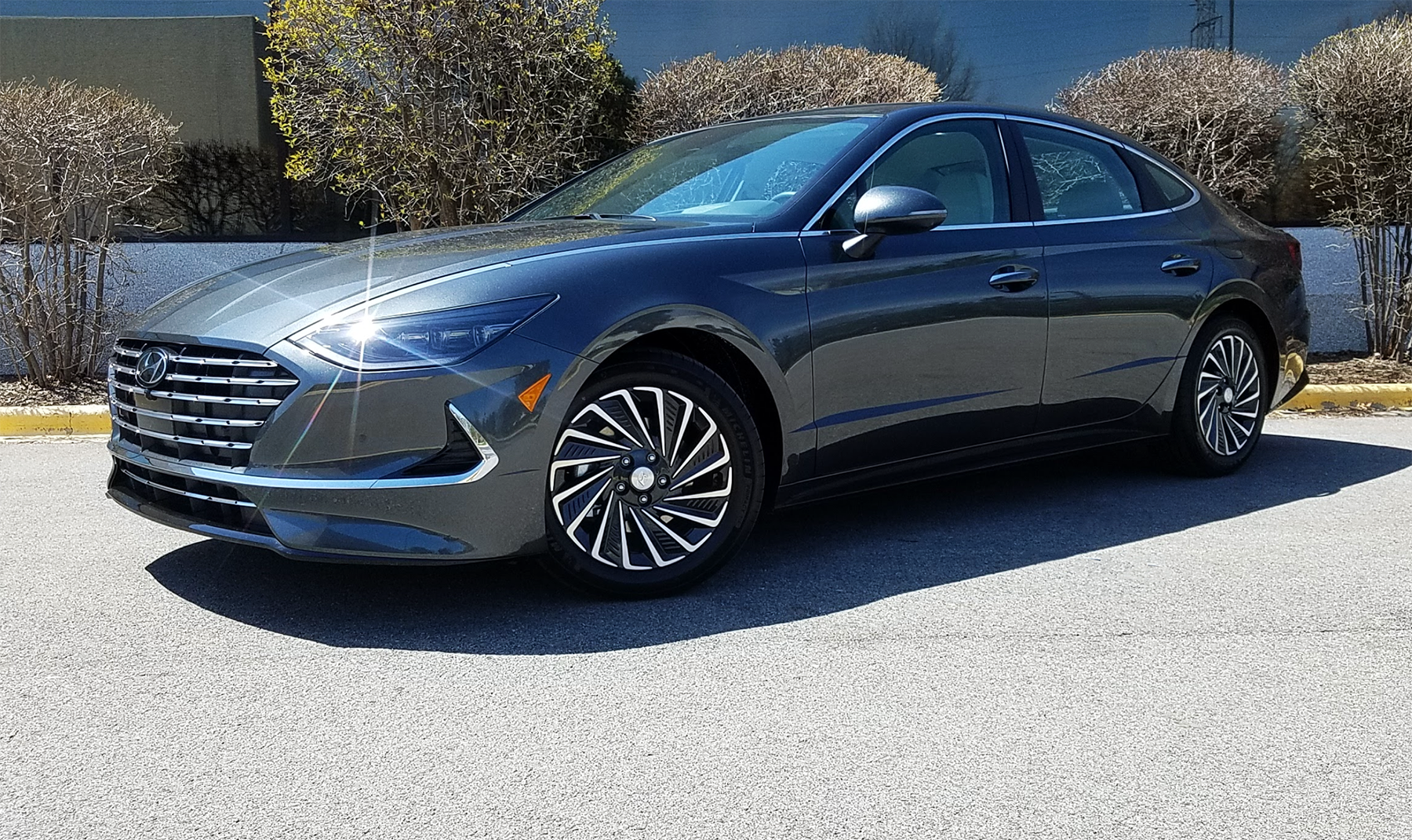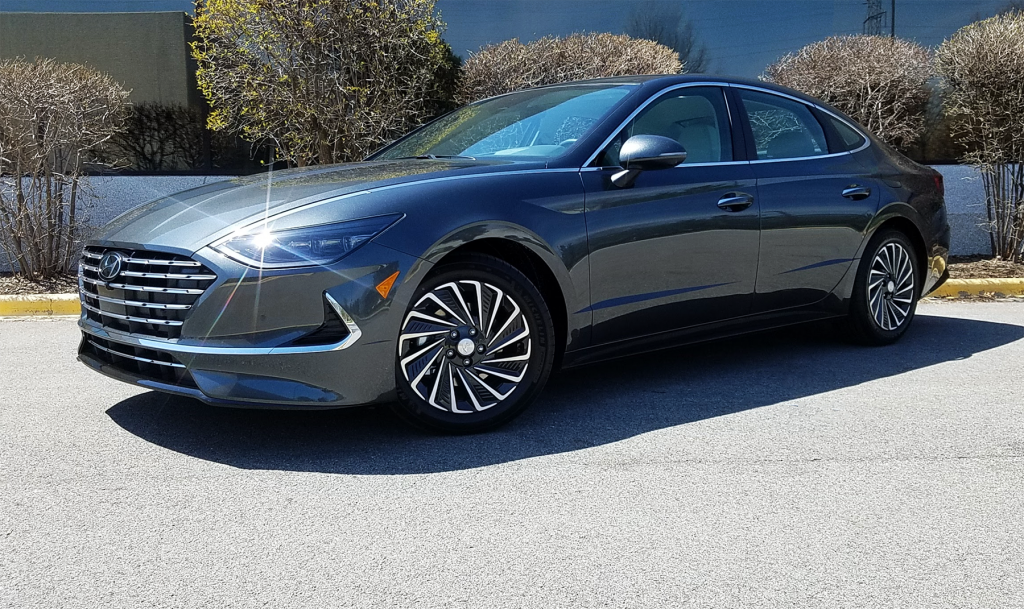
Class: Midsize Car
Miles driven: 460
Fuel used: 14.9 gallons
| CG Report Card | |
|---|---|
| Room and Comfort | B |
| Power and Performance | C+ |
| Fit and Finish | B+ |
| Fuel Economy | A |
| Value | A- |
| Report-card grades are derived from a consensus of test-driver evaluations. All grades are versus other vehicles in the same class. Value grade is for specific trim level evaluated, and may not reflect Consumer Guide's impressions of the entire model lineup. | |
| Big & Tall Comfort | |
| Big Guy | B |
| Tall Guy | B |
| Big & Tall comfort ratings are for front seats only. "Big" rating based on male tester weighing approximately 350 pounds, "Tall" rating based on 6'6"-tall male tester. | |
| Drivetrain | |
| Engine Specs | 192-hp 1.6-liter |
| Engine Type | 4-cyl hybrid |
| Transmission | 6-speed automatic |
| Drive Wheels | FWD |
Real-world fuel economy: 45.1 mpg
Driving mix: 55% city, 45% highway
EPA-estimated fuel economy: 45/51/47 (city, highway, combined)
Fuel type: Regular gas
Base price: $35,300 (not including $975 destination charge)
Options on test vehicle: Carpeted floor mats ($155)
Price as tested: $36,430
Quick Hits
The great: Comfortable ride; excellent, easy-to-use control layout
The good: Striking styling; innovative technology features; smooth hybrid powertrain
The not so good: Somewhat less spacious inside than leading class rivals
More Sonata price and availability information
John Biel
When the Hyundai Sonata left the past behind for 2020, it took the Sonata Hybrid with it. Hyundai’s midsize sedan is fully restyled—though Longer! Lower! Wider! has a nostalgic ring to it—and it boasts lots of new technology features. That’s true regardless of the power source.
There’s an expanded model lineup for Sonata hybrids. Available in SE and Limited trim in 2019, the fuel-stingy front-wheel-drive sedans now come in Blue, SEL, and Limited forms—which start at $27,750, $29,950, and $35,300, respectively. Consumer Guide sampled the top-line Limited model, which essentially comes loaded—there are no options save for colors and accessory items such as carpeted floor mats.
The core of the Sonata Hybrid is its 150-horsepower 2.0-liter direct-injection 4-cylinder engine that works with a 38kW 51-horse electric motor to produce a maximum system output of 192 horsepower. That’s somewhat behind the rated outputs of the hybrid Toyota Camry (208 horsepower) and Honda Accord (212 horsepower), and even a pony shy of the ’19 Sonata Hybrid. But the new gas/electric Sonata doesn’t seem as interested in a horsepower race as it is in an economy run.
Test Drive: 2020 Hyundai Sonata Limited
The EPA rates the SEL and Limited at 45 mpg in city driving, 51 mpg on the highway, and 47 combined, while the Blue is pegged at 50 city, 54 highway, and 52 combined. (The “extra-eco” Blue with smaller wheels and other modifications is claimed to be capable of going 686 miles on a tank of gas.) By those measures, the Sonata will give the Camry and Accord hybrids all they can handle. This driver averaged 44.4 mpg after a stint of 64 miles with 65 percent city-type operation.
Test Drive: 2020 Volkswagen Passat 2.0T SEL
In pursuit of aerodynamic efficiency, the Sonata Hybrid gets a few outward enhancements like black rocker skirts, a special rear spoiler, drag-reducing underbody elements, and a unique grille with active air flaps. SELs and Limiteds roll on 17-inch alloy wheels that are “alluring and aerodynamic,” Hyundai says. Furthermore, the Limited is available with a real sunroof—solar panels built into the roof panel that can charge both the 12-volt and hybrid batteries. The Solar Roof System produces a reported 205 watts of electricity and can increase the car’s driving range by a couple of miles after six hours of charging, as well as help prevent battery discharge from the climate and/or infotainment systems when the car is off.
Quick Spin: 2020 Toyota Corolla Hybrid LE
Sonata Hybrids come with a 6-speed automatic transmission. New “Active Shift Control” is designed to align the car’s electric motor with the rotational speeds of the engine and transmission for smoother, more-efficient shifts that are executed a claimed 30 percent faster. The trans is activated by a row of push buttons on the console, though the test car also had paddle shifters for the more “hands-on” driver. A console lever allows selection of “Eco,” “Smart,” “Sport,” and “Custom” drive modes that change throttle and shift behavior.
The car seems to behave best in Smart mode, with sufficient vim and vigor to get you around safely and, uh, sensibly, but without the harder-hitting shifts that make themselves apparent in Sport. The Sonata feels a little more eager in Sport, but not enough to make its behavior fun for long. Acceleration is downright tame in Eco. Ride and handling hew to ease and comfort more than control and precision, and braking displays a little of the uneven modulation and response that often befalls hybrids.
Hybrid Limited standard equipment includes the latest tech features being added to the Sonata in 2020: blind-spot view monitor, 10.25-inch touchscreen, and Hyundai Digital Key. The blind-spot monitor turns the left and right virtual-dial faces into displays that show a live view of blind spots on either side of the vehicle (depending on which turn signal is activated). An audible alert sounds if another vehicle is detected. The high-resolution touchscreen—the largest in its class—is an easy-to-read-and-operate display for things like navigation, audio, and other functions. Digital Key is an app that lets compatible smartphones serve as a key fob, and can remotely unlock the car and start the engine. The function can even be shared with family and friends through their phones. It is, however, only compatible with Android devices.
Other things you’ll find on a Hybrid Limited are leather upholstery, heated and ventilated front seats, head-up display, wireless smartphone charging pad with cooling fan, 12-speaker audio, dual-zone climate control with two convenient dials for setting temperature, keyless entry and starting, sun shades in the rear-door windows, hands-free trunk release, and LED headlights. The test car’s Portofino Gray paint was one of seven available colors. Driver-assistance and safety tech items include a surround-view camera; “SmartSense” safety suite (forward-collision avoidance with pedestrian detection, adaptive cruise control with stop-and-go functionality, blind-spot and rear cross-traffic collision avoidance, lane-following assist, lane-keep assist, automatic high-beam control, driver-attention warning, and rear-occupant alert); “Highway Drive Assist,” which can help keep the vehicle centered in its lane and maintain a safe distance from a vehicle ahead; and Blue Link connected services.
Test Drive: 2020 Toyota Prius Limited
The interior is laid out well, and is roomy to boot. The rear seat has “cozy” 3-adult space. Drivers enjoy good sightlines throughout the cabin. There’s decent dispersal of soft-touch surfaces, including all door tops. Personal-item storage is served by usefully sized glove and console boxes, a pouch on the back of the front passenger seat, door pockets (quite small in back) with bottle holders, and cup holders in the console and rear-center armrest. The large open bin ahead of the console is a “tech zone” with device inputs and room for the wireless charger.
Trunk space is ample. For more room, the rear seats fold down in a 60/40 split. While the seats rest flat, they are a little above the level of the trunk floor, and a bulkhead behind the seat reduces pass-through space.
The value-packed Sonata is starting a new chapter in 2020. Fleshed out with the hybrids, it is leaving no page unturned.
First Look: 2021 Hyundai Elantra
Check out the Consumer Guide Car Stuff Podcast
2020 Hyundai Sonata Hybrid Limited Gallery

2020 Hyundai Sonata Hybrid Limited